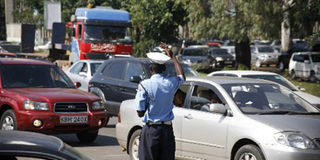Change of our mindset long overdue

A traffic police officer controls traffic at the Nyayo round-about along Uhuru Highway on December 24 2013. How do the police perceive themselves and how do ordinary citizens perceive them? PHOTO | PHOEBE OKAL
What you need to know:
- The most important question that must be addressed has to do with perception. How do the police perceive themselves and how do ordinary citizens perceive them?
Last Wednesday, we were treated to a rare occurrence in Kenya’s political discourse as the President was interviewed on television on all manner of things -- from his personal life to the achievements of the government.
I say rare because since independence, this is the first time we are witnessing that kind of engagement. Indeed, we are witnessing a real political cultural shift and I hope it is for the better.
Talking of culture, there is one matter that the President addressed which caught my attention. This is to do with the police and what the government intends to do for them and their working environment. He talked about housing and social security, among other issues.
What went through my mind is that all those physical and structural developments may be good. They may even be what is required to change certain attitudes that are associated with our police service. And there is no denying that the police are an important component of governance in our national setting.
But while all those developments are good and must be looked into, the most important question that must be addressed has to do with perception. How do the police perceive themselves and how do ordinary citizens perceive them?
CULTURE OF CORRUPTION
Every organisation has its own culture and the police are no exception. Whether it is true or not, the ordinary Kenyan sees the police culture as one of corruption.
To a large extent, the police have helped to create and perpetuate this perception. As infrastructural improvements are carried out to improve the lives of our policemen and women, this issue must be given due attention.
The other day, I listened to a sitting MP arguing vehemently about the role of a member of parliament in his constituency as regards resource allocation and implementation of development projects. My reading of articles 94 and 95 of the Constitution seems to suggest that the role of members of our National Assembly is restricted to representation, legislation and oversight.
The Constitution seems to leave development matters to the national and county governments.
I can understand why MPs would be uneasy with this kind of arrangement. In Kenya, leadership is about being seen to spend money.
The challenge we all face is how to go about changing this mentality. It is this outlook that causes all the acrimony, including violence, as people look for positions of “leadership”.
Father Wamugunda is Dean of Students at the University of Nairobi. [email protected]





